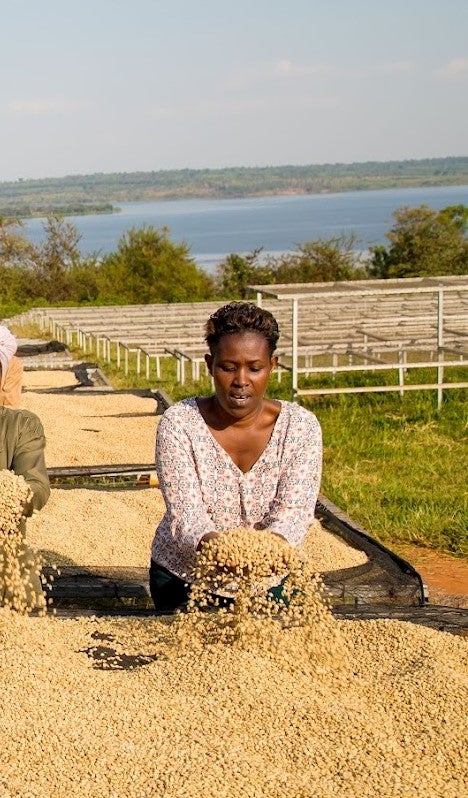From the Field, News
Monday, January 16, 2023
Meet Robinah
Meet Robinah Najjingo. She is the youngest of twelve siblings and now married with four kids of her own. In short, she is a trainer, a manager and a human rights advocate; she is based in Rwanda and is part of the Kahawatu Foundation. She believes in humility, accountability, and integrity.

Her passion to help people help themselves became evident at university where she trained classmates and shared lecture summaries with students who needed a hand. That’s also where she developed her skills in training and mentorship.
With a track record working for various organizations like Women for Women International, Reseau des Femmes and Action Aid International, Robinah has just worked together with HR to build a Gender Equality Policy and Strategy for Rwanda and may continue for East Africa. We interviewed her to find out more.
Why do we need to tackle gender equality in our supply chains?
Robinah: Gender cuts across all sectors. It’s about enhancing human rights and social inclusion.
At the moment, many women within coffee communities don’t have equal access to resources such as land, credit, or loans. In the bigger scheme of things, this negatively impacts coffee productivity and farmer income and can lead to increased poverty amongst women.
Training in gender equality allows for transparency in family and farm management and encourages collaboration in the use of family resources. They also help to build lasting relationships, trust, and shared values. If more organizations like Sucafina were to tackle gender inequality, run gender analyses for programs, and provide the tools for men and women to improve together, I truly believe a higher quality of coffee would be produced.
How did you get into this field of work?
Robinah: When I graduated, I got a job as a social empowerment trainer, a job I liked very much. It was an outlet for achieving my dream of supporting people, preventing gender-based violence (GBV), and promoting social justice.
Later, I realized that there were inequalities at my workplace and in the communities we were serving; this is what motivated me to pursue a master’s degree in Gender and Development Studies.
How did you end up in the role as Gender Lead for Kahawatu Foundation and Sucafina in East Africa?
Robinah: Due to the strong relationship between the Kahawatu Foundation and Sucafina, there was an opportunity for me to promote gender equality, diversity, and social inclusion within a multinational company and showcase how social issues can affect businesses when left unattended.
As Sucafina’s sustainability strategy grows and we develop our policy to identify and mitigate human rights issues in our supply chain, it is vital that we, as an organization, fully understand the importance of inclusion. We also need to be able to successfully embed it in our sustainability programs, taking into account what’s feasible at origin with regards to religion and culture.
What does your role as Gender Lead entail?
Robinah: At strategic and tactical level: Designing all gender-related materials including policy, strategy, training, and communication materials. Advising the management team on all work related to gender in the coffee value chain. With support from management, soliciting partnerships and engagement.
At operational level: Conducting trainings for staff and coffee farmers on gender equality. Supporting other Sucafina offices with training and advise on gender-related work. Support project implementation like Net Zero and Nestlé-Zoégas and monitor progress of CSVII (Creating Shared Value) in Rwanda.
What are you working on at the moment?
Robinah: At RWACOF (Sucafina in Rwanda), we’re developing gender-responsive infrastructure, like building a safe room for women seasonal workers to go and rest during their breaks.
I’m also training our staff on gender issues and policy frameworks provided by the government; designing a gender training module for our staff; running trainings on gender equity and financial literacy; and educating communities on sexual reproductive health together with local health centers.
What's been the hardest or most enlightening part of your job?
Robinah: The most challenging part is changing mindsets. We live in a patriarchal system where men are the dominant player, which is difficult to change. That shift requires continuous mobilization, raising of awareness, engagement with men, and monitoring the implementation of our gender equality policy.
The most enlightening is how farmers liked the gender trainings and keep requesting for more sessions. And the support I have received from RWACOF's leadership.
Top 5 things about Robinah
- Robinah is the youngest of twelve siblings and now married with four kids of her own. In short, she is a trainer, a manager and a human rights advocate.
- She is based in Rwanda, East Africa.
- After graduating, Robinah got a job as a social empowerment trainer; supporting people, preventing gender-based violence (GBV), and promoting social justice.
- She is now the Gender Lead for Kahawatu Foundation and Sucafina East Africa; promoting gender equality, diversity and social inclusion at farmer level and within a multinational company.
- Together with RWACOF, she is developing gender-responsive infrastructure, like building a safe room for women seasonal workers to go and rest during their breaks.